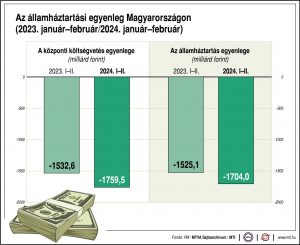The government expects economic growth between two and three percent this year, with ambitions for a sustainable increase to around four percent by 2025, as articulated by the Minister for National Economy during a press conference in Budapest, where he introduced the freshly adopted competitiveness strategy for 2024-2030.
Márton Nagy acknowledged that while growth may not reach four percent this year due to temporary weaknesses in export markets, achieving this target in the long term is feasible. The competitiveness strategy, he emphasized, is not formulated from a top-down perspective, but is shaped by input from nearly 1,300 companies, either directly or through professional organizations.

Minister for National Economy, Márton Nagy. Photo: Facebook / MCC
Highlighting the need for fine-tuning rather than a complete economic overhaul, Minister Nagy reiterated the government’s steadfast objective for Hungary to reach 90 percent of the EU’s development level by 2030.
This necessitates an employment rate of 85 percent and an investment rate of 30 percent of GDP, including a 20 percent corporate investment rate.
The Minister underscored the aim to re-industrialize the economy, targeting exports of goods reaching 100 percent of GDP and manufacturing constituting 30 percent. By 2030, Hungary aims to rank among the 20 most competitive countries globally.
In addition to investment quantity, Mr. Nagy stressed the
importance of qualitative productivity improvements for convergence and competitiveness, emphasizing the role of quality in economies of scale.
Key policies he has outlined include providing a high-quality workforce, mobility and training allowances, steady real wage increases, reducing income inequalities, and promoting firm efficiency and competitiveness through subsidized credit and capital programs.
The Minister identified the competitiveness strategy’s priorities, including developing domestic suppliers, supporting research, development, and innovation, and strengthening Hungarian-owned industrial companies to create “Hungarian champions.”

Balance of the government budget in March, 2023. Picture: MTI
Gergely Fábián, State Secretary for Industrial Policy and Technology, detailed the competitiveness strategy’s focus on six priority sectors. In the automotive industry, Hungary aims to lead emerging sectors by strengthening the competitiveness of domestic suppliers and developing the electromobility scene.
In the food industry, efforts will be directed toward ensuring supply security against geopolitical challenges and promoting exports. Mr. Fábián highlighted Hungary’s goal of achieving self-sufficiency in essential healthcare equipment by 2030, and increasing the share of Hungarian products in domestic healthcare.
Related article
Protective Measures Needed to Save the Meat Industry
The government should take measures that would strengthen the sales opportunities for Hungarian meat products.Continue reading
Regarding the chemical, steel, and plastics industries, he noted the potential in adapting to new technological trends, with the main challenge being the green transition of the sector. Information and communication technology and the creative industries are also priority sectors of the competitiveness strategy.
It is important to note that despite increased budget revenues compared to last year, the general government deficit reached HUF 1750B (EUR 4.4B) in February 2024. In the first two months, 15.6 percent of the budgeted income was received by the general budget: HUF 5,974B (EUR 15B) out of HUF 38,240B (EUR 96.5B) was realized. This is higher than last year’s HUF 5,363B (EUR 13.5B) and is also higher in relative terms than the 14.7 percent in 2023. However, the state’s main tax revenues from Value Added Tax (VAT) remain low. The significant deficit was caused, among other things, by extraordinary expenditures last year, such as the financing of 13th-month pensions.
Related article
The Economy Returns to Growth, Minister of Finance Says
Th Minister shared great expectations in his speech held at the Ludovika University of Public Service.Continue reading
Via: MTI; Featured Image: Pixabay

